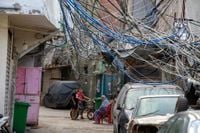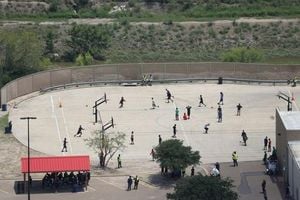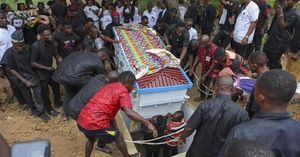On a tense Saturday morning in Lebanon, the echoes of a decades-old dilemma reverberated through the crowded alleyways of Ain al-Hilweh and Beddawi, two of the country’s largest Palestinian refugee camps. For the first time in years, truckloads of weapons—long held by Palestinian factions—were formally surrendered to the Lebanese army, signaling a pivotal moment in the government’s campaign to bring all arms under state control.
The operation, which began in earnest in August 2025, reached a new milestone on September 13, when five truckloads of weapons left Ain al-Hilweh, near the southern city of Sidon, and three more departed Beddawi, close to Tripoli in the north. According to The Media Line, the weapons belonged to factions affiliated with the Palestine Liberation Organization (PLO), and their transfer was confirmed by Abdul Hadi al-Assadi, spokesperson for the Palestinian National Security Forces in Lebanon. The Lebanese army, in a statement cited by AFP, specified that the delivery included "various types of weapons, shells, and ammunition."
Security was tight throughout the process. Lebanese army vehicles surrounded the camps, preventing outsiders from approaching, while covered trucks rolled out under careful watch. An AFP journalist stationed near Ain al-Hilweh described the scene as tense but orderly, with military vehicles posted at every entrance. In Beddawi, three covered trucks were seen leaving the camp, escorted by the army—an image that would have been unimaginable only a few years ago.
This campaign, as reported by MENAFN, is part of a broader roadmap adopted by Lebanon’s Cabinet in August 2025. The government resolved that all arms in the country—including those held by Hezbollah, the powerful Shiite movement—must be confined to the authority of the state. The Lebanese armed forces were instructed to prepare and execute a comprehensive plan before the end of 2025, aiming to extend state sovereignty over all its territory, including the notoriously autonomous Palestinian camps.
Yet, the handover is far from complete. Hamas and Islamic Jihad, two influential Palestinian militant groups not affiliated with the PLO, have not announced any plans to disarm in Lebanon. The Lebanese-Palestinian Dialogue Committee, an entity linked to the prime minister’s office, acknowledged in a statement that it is "continuing its meetings with various Palestinian factions, including Hamas and Islamic Jihad," as part of its "commitment to extending its sovereignty over all its territory."
The roots of Lebanon’s disarmament push go deep. For decades, the country’s 12 Palestinian refugee camps—home to approximately 222,000 refugees, according to UNRWA—have existed in a legal and political limbo. By longstanding convention, the Lebanese army does not enter these camps, leaving security to Palestinian factions. Ain al-Hilweh alone, which houses an estimated 75,000 residents, has often been a flashpoint for violence. In 2023, the camp witnessed fierce clashes between Fatah-aligned forces and Islamist groups, leaving 30 dead and hundreds wounded, as reported by The Media Line.
The current campaign was set in motion during a May 2025 meeting in Beirut between Palestinian President Mahmud Abbas and Lebanese President Joseph Aoun. Both leaders agreed that weapons in Palestinian camps would be handed over to Lebanese authorities, marking a rare moment of consensus. The process began in August, with the army receiving weapons from camps in Beirut’s southern outskirts and around the southern city of Tyre, before moving north to Beddawi and south to Ain al-Hilweh.
This initiative comes on the heels of a tumultuous year. In September 2024, cross-border clashes between Israel and Hezbollah escalated into a full-scale conflict, drawing in Palestinian groups, including Hamas, who claimed rocket fire toward Israel. A truce was finally brokered in November 2024, but its implementation has been fraught with challenges. According to MENAFN, Israel was expected to withdraw fully from southern Lebanon by January 2025 but has only partially done so, maintaining military positions at five frontier outposts.
Hezbollah’s role in the unfolding drama cannot be overstated. Once the country’s most powerful political and military force, Hezbollah emerged from the 2024 war significantly weakened. Yet, its Secretary-General, Naim Qassem, has publicly rejected the government’s disarmament push. As MENAFN reported, Qassem declared that Hezbollah would not surrender its arsenal unless Israel evacuated all occupied Lebanese lands, ended hostilities, freed detainees, and allowed reconstruction efforts to begin.
Meanwhile, the challenges facing the Palestinian camps remain acute. Many residents live in overcrowded, impoverished conditions, often outside the reach of Lebanese law. The Beddawi camp, for instance, was struck by Israeli air raids in 2024, killing a Hamas commander, his wife, and two daughters, as confirmed by the Palestinian militant group and reported by AFP. Such tragedies underscore the volatility that continues to haunt these communities, even as disarmament proceeds.
Lebanon’s plan for the border region is ambitious. According to Foreign Minister Youssef Raggi, the first phase calls for the complete disarmament of the area adjacent to Israel within three months, with four additional phases to follow. The ultimate goal is to monopolize all weapons with the Lebanese army, a prospect that, if realized, would mark a historic shift in the country’s security landscape.
Yet, significant hurdles remain. The disarmament deal, as The Media Line notes, excludes certain Islamist factions not party to the agreement. The slow progress of the process reflects both the complexity of the task and the deep mistrust between the various actors. For many Palestinians, the camps are not just places of refuge but also symbols of their struggle and identity—making the surrender of arms a fraught and emotional process.
Still, the events of September 13, 2025, represent a tangible step forward. As Abdel Hadi al-Assadi of the PLO put it, the operation involved "delivering new batches of weapons," a phrase that hints at both the incremental nature of the process and the hope for a more secure future. Whether this hope will be realized remains to be seen, but for now, Lebanon’s government, its army, and the Palestinian factions have taken a significant, if tentative, stride toward ending the armed autonomy of the camps and restoring state authority—one truckload at a time.




